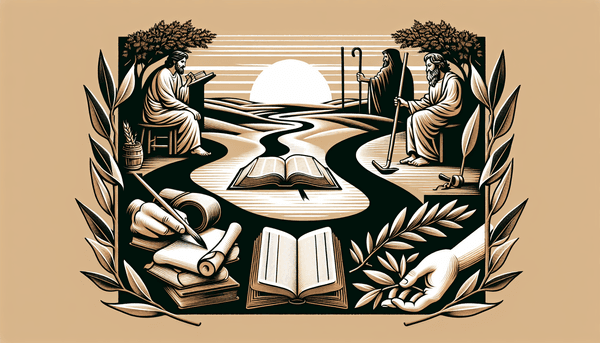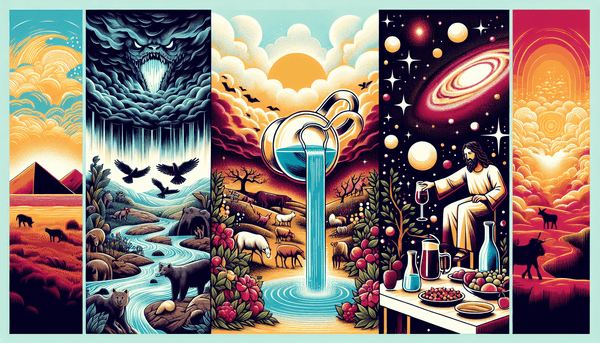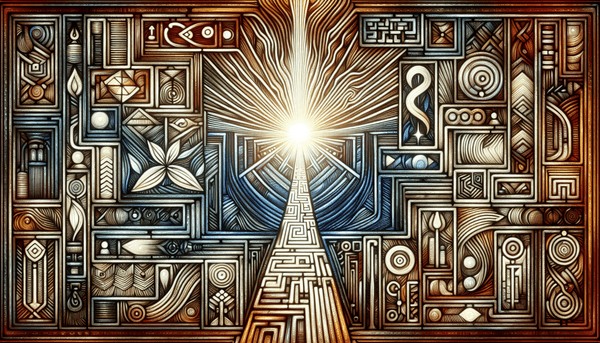The Biblical Basis for Human Creation
At the heart of the Biblical narrative is the notion that God created humans for a distinct purpose. In Genesis 1:26-27, we learn that mankind was made 'in the image of God,' a phrase that underscores our unique capacity for a personal relationship with the Divine. This relationship is further explicated in John 17:3, where Jesus speaks of eternal life as knowing God. The Revelation 21:3 promises a future where God's dwelling is with humanity, indicating a deep, ongoing connection. In reflecting God's image, we are also called to embody His characteristics, as suggested in 2 Corinthians 3:18, which speaks of being transformed into His likeness, and Ephesians 2:10, which portrays us as crafted for good works. The concept of dominion and stewardship is introduced in Genesis 1:28, where humans are instructed to 'fill the earth and subdue it.' This stewardship is echoed in Psalms 8:6-8, which speaks of our role over the works of God's hands, and Hebrews 2:6-8, which confirms humankind's place in creation.
Theological Interpretations of Human Purpose
While the Bible provides a foundational understanding of human purpose, the full scope of why God created us can be enveloped in mystery. Ecclesiastes 12:13 reminds us that the duty of humanity encompasses fearing God and keeping His commandments. Delving into the unknown depths of God's riches, wisdom, and knowledge, as mentioned in Romans 11:33, requires humility and acknowledgment of the divine mystery. The role of free will is a pivotal element of this theological puzzle. Scriptures like Deuteronomy 30:19-20 emphasize the importance of choosing life and blessing, while Joshua 24:15 presents the decision to serve the Lord as a matter of personal choice. The notion of seeking is central to our quest for meaning; Proverbs 8:17 encourages the pursuit of wisdom, and Matthew 7:7-8 assures us that those who seek will find. Acts 17:27 beautifully illustrates God's nearness and desire to be found by humanity.
Conclusion
In conclusion, our exploration of the reasons behind human creation from a Biblical perspective reveals a multifaceted relationship with the Divine, an invitation to bear His image, and a calling to steward the earth. While the existence of God and the reasons for our creation ultimately remain matters of personal belief and faith, the scriptures offer profound insights into these existential questions. This article has only scratched the surface of a dialogue that spans centuries and cultures. If you're interested in further exploration, we encourage you to read our complementary discussion on the Bible's teachings and their relevance to our modern world. We hope this serves as a starting point for readers to reflect on their own existence and to seek a deeper understanding of their purpose, both in the biblical text and through personal reflection and discovery.
FAQ
Q: What is the motive for God creating the human race?
A: According to the Bible, God created the human race to have a relationship with Him, to reflect His image, and to have dominion over the earth as stated in Genesis 1:27-28.
Q: Can you explain why God created humans using another Bible verse?
A: Beyond Genesis, other Bible verses such as Isaiah 43:7 mention that God created us for His glory, suggesting that our existence is meant to reflect and honor the divine.
Q: What is the proof that God made us?
A: The proof that God made us is a matter of faith for many. Believers see the complexity of the human body and mind, our ability to reason, and our yearning for meaning as evidence of intelligent design and a higher power's work.
Q: Where can I find answers about eternal truths?
A: The Bible encourages seeking wisdom and understanding through its scriptures. Verses like Matthew 7:7-8 suggest that those who actively seek truth and understanding will find answers and be rewarded for their diligence.






